
*
After 50 years, To Kill a Mockingbird [Universal] still looks pretty good. Or better, thanks to an excellent new Blu-ray transfer. This 50th Anniversary Edition of Robert Mulligan's classic, issued as part of the Universal 100th Anniversary Collector's Series, somehow seems even more impressive as the years pass. Back in 1962 it was dangerously provocative, yes, at a time when segregation was still alive and well and legal in the deep South. That overlay of controversy is gone, thankfully so; few viewers today are likely to argue in favor of the sadistic villain Bob Ewell. Thus, we can concentrate on the moral questions posed by novelist Harper Lee and screenwriter Horton Foote without being sidetracked by what was then a contemporary political discussion.
Gregory Peck stands out in his Oscar-winning role of Atticus Finch. It is simple enough to call this the performance of his career, although that might be disputable if you stop to consider his full body of work. In any case, Peck is wonderful here. (Some of this excellence, I suppose, has to be credited to Ms. Lee and Mr. Foote.) Peck is joined by a fine array of actors, with six of the nine featured players coming direct from Broadway.
Most remarkable of the group is Mary Badham as Scout, the girl at the film's center. (At ten, she was the youngest actor nominated for an Oscar; as luck would have it, she lost to 16-year-old Patty Duke in "The Miracle Worker.") Phillip Alford, too, gives a lovely performance as the boy Jem. The third child in the group was nine-year-old John Megna, as the Truman Capote-inspired Dill. Megna — who at seven played Tony Perkins' brother in the Frank Loesser musical Greenwillow, immediately followed by the role of Colleen Dewhurst's son in the Pulitzer Prize-winning play All the Way Home — is especially striking. Other performances of note come from Brock Peters, as the innocent man convicted of rape (direct from Kwamina); and a ghostly young Robert Duvall as the mysterious Boo Radley. If the off-screen narrator sounds familiar, that's because it's the uncredited Kim Stanley.
The new release is filled with worthy bonus features that will enhance the viewing experience for the film's many fans. These include "Fearful Symmetry," a documentary on the making of the film; "A Conversation with Gregory Peck"; Peck's acceptance speech when he won his "Mockingbird" Oscar, along with his acceptance of the AFI Lifetime Achievement Award; a segment of the Academy's tribute to Peck, featuring daughter Cecilia; Mary Badham reminiscing about playing Scout opposite Peck's Atticus; and feature commentary from director Robert Mulligan and producer Alan Pakula. These appear on both the DVD and Blu-ray releases. Exclusive to the Blu-ray are "U-Control," which takes you behind the scenes with Peck's children Cecilia and Anthony Peck. Universal has wrapped this "Mockingbird" in a handsome package. The 44-page hardcover slipcase contains an introduction by Peck's wife Veronique, who tells us that her husband's one request when he was dying in 2003 was that Brock Peters give his eulogy; a selection of posters, window cards, news clippings, and telegrams received by the star when he won his Oscar; storyboard samples; and assorted sheets from Peck's shooting script — with the words "fairness," "stubbornness," "courage," and "love" scrawled on the final page. There is also an introduction from novelist Lee, who became a long-time friend and shares with us Gregory Peck's secret: "When he played Atticus Finch, he played himself."
Visit PlaybillStore.com to check out theatre-related DVDs for sale.
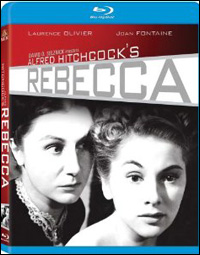 |
||
| Cover art for "Rebecca" |
Cinematographer George Barnes won the film's other Oscar, for cinematography (black-and-white), and his work stands out on Blu-ray. Composer Franz Waxman did not win the Oscar for which he was nominated, but his music is highly effective. Special features include commentary from Richard Schickel; "The Making of 'Rebecca'" and "The Gothic World of Daphne Du Maurier; and screen tests.
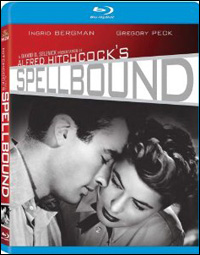 |
||
| Cover art for "Spellbound" |
Special features include commentary from film professors Thomas Schatz and Charles Ramirez Berg; the documentaries "Dreaming with Scissors: Hitchcock, Surrealism and Salvador Dali" and "Guilt by Association: Psychoanalyzing 'Spellbound'"; and a 1948 radio-play version with Bergman and Joseph Cotton. "Spellbound" is a great favorite in some circles; it never quite grabs me — despite the combination of director, stars, and screenwriter Ben Hecht — but don't let that dissuade you.
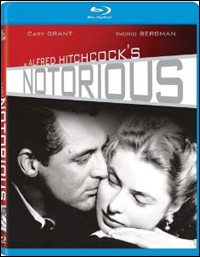 |
||
| Cover art for "Notorious" |
Special features include commentary by film professors Rick Jewell and Drew Casper; the documentaries "The Ultimate Romance: The Making of 'Notorious'" and "Alfred Hitchcock: The Ultimate Spymaster"; a restoration comparison; and yet another 1948 radio version starring Bergman and Joseph Cotton.
Visit PlaybillStore.com to check out theatre-related DVDs for sale.
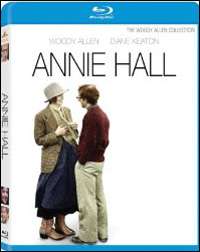 |
||
| Cover art for "Annie Hall" |
The 1979 "Manhattan" is Allen's love-letter to the city in question, enhanced by the music of George Gershwin and the black and white cinematography of Gordon Willis. Has Manhattan — the island — ever looked so romantically evocative? Stars Allen and Keaton are in this instance joined by Michael Murphy, Mariel Hemingway, Anne Byrne, Wallace Shawn and soon-to-be-superstar Meryl Streep. Allen shared screenwriting chores with Marshall Brickman, who also served as collaborator on "Annie Hall."
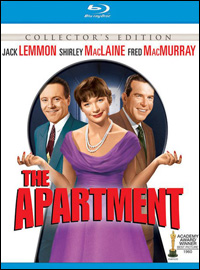 |
||
| Cover art for "The Apartment" |
Unlike the Hitchcocks that accompany them in this grand six-film bouquet from MGM, the three comedies are light on special features. But as far as I'm concerned, these films from Allen and Wilder are special features in themselves.
*
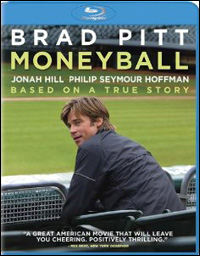 |
||
| Cover art for "Moneyball" |
Of more than passing interest is the performance of Philip Seymour Hoffman as Art Howe, the crusty, old and stubborn manager of the team. Hoffman is just now in rehearsal for the Mike Nichols production of Death of a Salesman which is soon to move into the Barrymore. Is the 44-year-old Hoffman too young to play Willy Loman? Anyone accustomed to watching the actor will already know the answer, but Hoffman's "Moneyball" performance in itself suggests that his Willy Loman will be compelling.
*
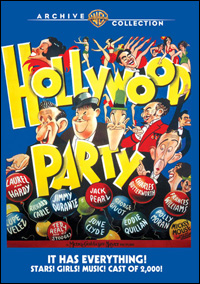 |
||
| Cover art for "Hollywood Party" |
This is the sort of all-star party in which people like Laurel and Hardy come to the door as gatecrashers and wind up playing a scene in which they smash raw eggs into the chest of Lupe Velez, who crushes one down Hardy's trousers. At the gates, unable to crash the party, are the Three Stooges getting smacked in the head. Jack Pearl appears in the guise of Baron Munchausen, Charles Butterworth mumbles around the place as an oil millionaire, and there's even a bonafide Broadway star circa 1906 on hand in the person of comedian/lyricist/librettist/director Richard Carle.
Among the guests at the party is a mouse named Mickey (voiced by Walt), who taunts Jimmy — for a moment we even get Mickey with a Durante schnozz — and then introduces a Disney Technicolor short built around the Nacio Herb Brown/Arthur Freed song "Hot Choc'late Soldiers."
Speaking of songs, there are three from the then-struggling Broadway team of Richard Rodgers and Lorenz Hart. The title song is quite catchy, actually; it's sung by Frances Williams — who introduced "As Time Goes By" on Broadway in 1931—and a bevy of girls. These girls are kaleidoscopically used; there are several numbers that seem to want to out-Busby Busby Berkeley. The other two R & H songs are special material for Durante, "Hello" and "Reincarnation." Both are extended, and unusual; the boys wrote more of the same for Jimmy the following year, in the Broadway musical Jumbo.
Let us also add that this film came just before the Code cleaned up Hollywood's act, as can easily be seen in the costumes on the girls. Ms. Velez — "The Mexican Spitfire," they called her — wears a dress unlike any you might have seen, then or even now.
(Steven Suskin is author of the recently released Updated and Expanded Fourth Edition of "Show Tunes" as well as "The Sound of Broadway Music: A Book of Orchestrators and Orchestrations," "Second Act Trouble" and the "Opening Night on Broadway" books. He also pens Playbill.com's Book Shelf and On the Record columns. He can be reached at [email protected].)
*
Visit PlaybillStore.com to check out theatre-related DVDs for sale.

Evan-Zimmerman-for-MurphyMade.jpg)







